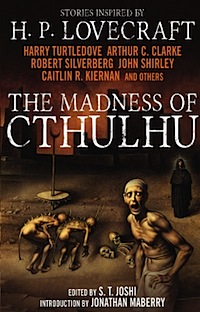Welcome back to the Short Fiction Spotlight, a weekly column dedicated to doing exactly what it says in the header: shining a light on the some of the best and most relevant fiction of the aforementioned form.
With three volumes of Black Wings behind him, S. T. Joshi—the one Lovecraft scholar to rule them all—has taken the reins of another eldritch anthology project, and it’s as lush as his last.
Alongside a couple of classics—not least a lark by Arthur C. Clarke—The Madness of Cthulhu features fourteen “never-before-seen” stories of Old Ones and shambling shoggoths inspired, in this instance, by “the pinnacle of Lovecraft’s ‘cosmic’ vision and his union of traditional supernatural fiction with the burgeoning genre of science fiction.” Joshi speaks, here, of At the Mountains of Madness: a grimly fascinating narrative in which the geologist William Dyer leads an expedition into the Antarctic, only to find there—in a strange stone city composed of cubes and cones; an apparently abandoned marvel of alien architecture—evidence of ancient, intelligent and finally malign life…
Dyer’s party was not, however, the first to fall victim to it. An advance expedition, led by Arthur Lake—another of Lovecraft’s men from Miskatonic—was also lost, but not before the poor professor found proof of his hypothesis “that earth has seen whole cycles of organic life before known one that begins with Archaeozoic cells.”
Put to one side the ultimate accuracy of his averring. Why, we might be inclined to ask, was Lake given to think such a thing to begin with? In ‘A Mountain Walked’—my favourite of The Madness of Cthulhu’s sixteen stories—Caitlin R. Kiernan asks and answers that very question by way of an epistolary tale which takes place some fifty years ahead of the events of Lovecraft’s novella.
These “excerpts from the Field Journal of Arthur Lakes During His Explorations for Saurians and Fossil Remains in the Wyoming Territory” in May and June 1879 begin blandly, with Lake and his lot excavating quarry after quarry in search of dinosaur fossils. Some small discoveries are, admittedly, made, yet the journal’s early entries are concerned with nothing so much as the sketching of landscapes and the hunting of lunch. That the most exciting moment of the first few weeks Lake spends on site is the arrival of the party’s paymaster, Professor March, is telling, to be sure.
On the other hand, this mundanity serves to suggest a certain tension, in the first because we find the text in question in an anthology called The Madness of Cthulhu—bad things are as good as guaranteed to happen. Furthermore, it functions to foreground the occasional oddities Lake himself has little interest in, such as ”the matter of the Indian artefact found […] at Quarry No. 4. [Reed] remains most unaccountably agitated on the subject and insists we are inviting calamity of one sort or another by not returning it.”
Now here is a respected man, a seasoned hunter and guide and RR employee, former infantryman in the Union Army, and always have I held him in high esteem, certainly not regarding him as the sort given to the wild and frankly credulous attitude he seems to have adopted in the past few days. […] In any case it is clear [Marsh] will do no such thing as part with the curious relic, which I will admit is not a pleasant object to look upon as is the case with many of the redskin’s fetishes, but hardly is it either cause for such behaviour as Reed’s.
About that, actually…
Before long, “an extraordinary and uncanny occurrence” gives incontestable credence to Reed’s fears, leaving the party in “a state of disarray” on the day—and forever after, in Lake’s case. “An eerie silence” descends upon the camp. A great shadow blots out the stars. And then?
This is when the woman stepped out of the darkness, or it seemed more that the night parted like a theatre curtain to reveal her. Reed lowered his rifle and stepped back, putting distance between her and him. I call her a woman but in truth I readily acknowledge this to be only an approximation, the best word I know to describe what stood before us.
What follows is a darkly fantastic finale which more than pays off the patience presupposed by the fiction’s first part, summarily shattering the monotony of the men’s mission.
Caitlin R. Kiernan’s mastery of the short form is not news. She’s been behind some of the finest dark fantasy of the century so far, in fact—as the editor of The Madness of Cthulhu asserted in his Dead Reckonings review of The Red Tree—so the success of ‘A Mountain Walked’ is, I suppose, hardly surprising.
What is is its deliberately stilted composition. Kiernan’s prose is beautiful, usually—lyrical and allusive—but most of ‘A Mountain Walked’ is not. Instead, Lake’s voice is matter-of-fact, and largely detached, which does a great deal to emphasise the everyday nature of the explorations.
That changes when the almost-woman appears out of the ether. All of a sudden, our narrator is engaged; afraid yet fascinated by the unspeakable something he sees. Kiernan is in her element here, and the insidious shift from mundanity to madness leaves the reader reeling, as if from a vision of such absolute clarity that the dreamer’s grasp of reality relaxes.
A remarkable demonstration of Kiernan’s range and restraint, ‘A Mountain Walked’ is in my eyes the highlight of The Madness of Cthulhu’s eldritch extensions—acclaim all the more meaningful considering the excellence of the other authors’ efforts.
Roll on the second volume of Joshi’s latest anthology project in Halloween 2015.
The Madness of Cthulhu is out now from Titan Books
Niall Alexander is an extra-curricular English teacher who reads and writes about all things weird and wonderful for The Speculative Scotsman, Strange Horizons, and Tor.com. He’s been known to tweet, twoo.










